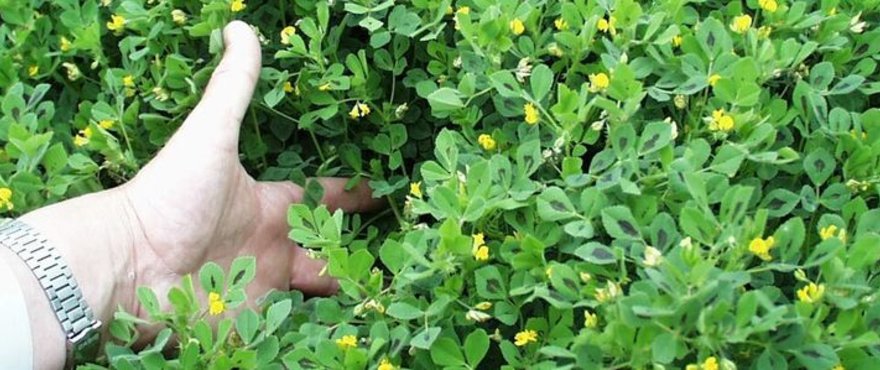Download a copy of the Jester Barrel Medic factsheet.
Jester (Medicago truncatulata) is an aphid resistant barrel medic. This variety was developed by the South Australian Research and Development Institute (SARDI) as a superior replacement for Jemalong, which has much improved aphid resistance to blue-green aphid and spotted alfalfa aphid. Jester will provide increased herbage production and pest resistance for low to medium rainfall areas with alkaline soils. It will provide an effective disease break, while providing high quality feed for either hay or grazing purposes while also fixing nitrogen, which is valuable for subsequent crop rotations. Barrel medics are better suited to permanent pastures than snail medics and have a very high level of hard seed. This ensures good persistence even through cropping phases of a rotation.
Key features
- Hard seeded barrel medic
- Mid season (110 days to flowering)
- Jemalong hybrid with improved performance
- Vastly improved aphid resistance (BGA and SAA)
- Retains distinctive leaf blotch of Jemalong
Key benefits
- Superior alternative to Paraggio and Parabinga
- Regenerates well after cropping phase of 1–3 years
Pest Resistance
Jester has good resistance to both blue-green aphid (Acyrthosiphon kondoi) and spotted alfalfa aphid (Therioaphis trifolii) but is susceptible to cowpea aphid (Aphis craccivora). Like most other medics, Jester is susceptible to red legged earth mite (Halotydens destructor), lucerne flea (Sminthurus virdis), sitona weevil (Sitona discoidea) and potentially root lesion nematode (Pratylenchus neglectus). Appropriate control of these insects prior to sowing or soon after germination is required for successful establishment.
Disease Resistance/Tolerance
Jester is generally free of foliar diseases but can occasionally be affected by black stem fungus (Phoma spp.) in undergrazed lush stands. Jester, as with other medics, suffers from rhizoctonia (Rhizoctonia spp).
Agronomy and management
Jester demonstrates high levels of hard seed (up to 90%) and is able to regenerate well in the year after seed set or after a cropping phase. This allows Jester to build up a greater reserve of seed in the soil over time, thus ensuring persistence, particularly in cereal rotations. The levels of hard seed in the soil will soften over a 5–10 year period, which is an extremely important characteristic of medic’s ability to survive over a long period of time in marginal rainfall districts. However this can limit the level of germination in the year after first sowing as little of the hard seed would have been given sufficient time to breakdown. During establishment, defer grazing until plants are well established, lightly graze prior to flowering and then remove stock to allow seed set. Summer grazing needs to be managed carefully in the first year, as overgrazing will reduce future regeneration. Once established, Jester persists well under rotational grazing, ensuring good early ground cover but also promoting prostrate plant growth. Jester can be grazed in the first year of sowing, providing fresh feed in winter and spring and dry feed in the summer and autumn.
Plant Breeders Rights (PBR): This variety is registered under Plant Breeders Rights (PBR) in Australia. Unauthorised commercial propagation or any sale, conditioning, export, import or stocking of propagating material is an infringement under the Plant Breeders Rights Act (1994). Any breach of this legislation will leave the grower liable for prosecution.
Disclaimer: The information presented in this brochure is from official and other sources and is considered to be reliable. It is provided in good faith and every care has been taken to ensure its accuracy. Barenbrug does not accept any responsibility for the consequences that may arise from the acceptance of recommendations or the suggestions made.


